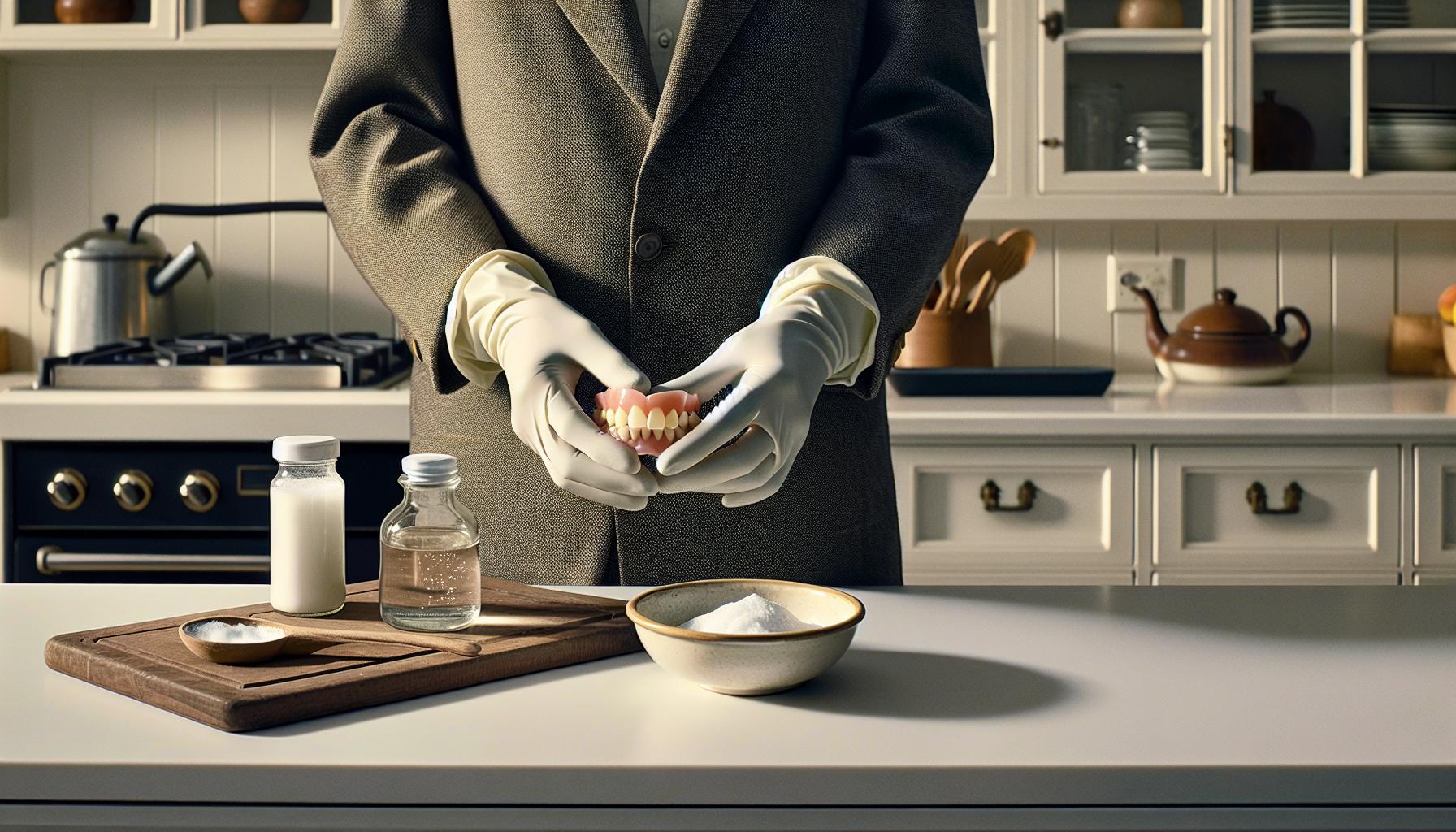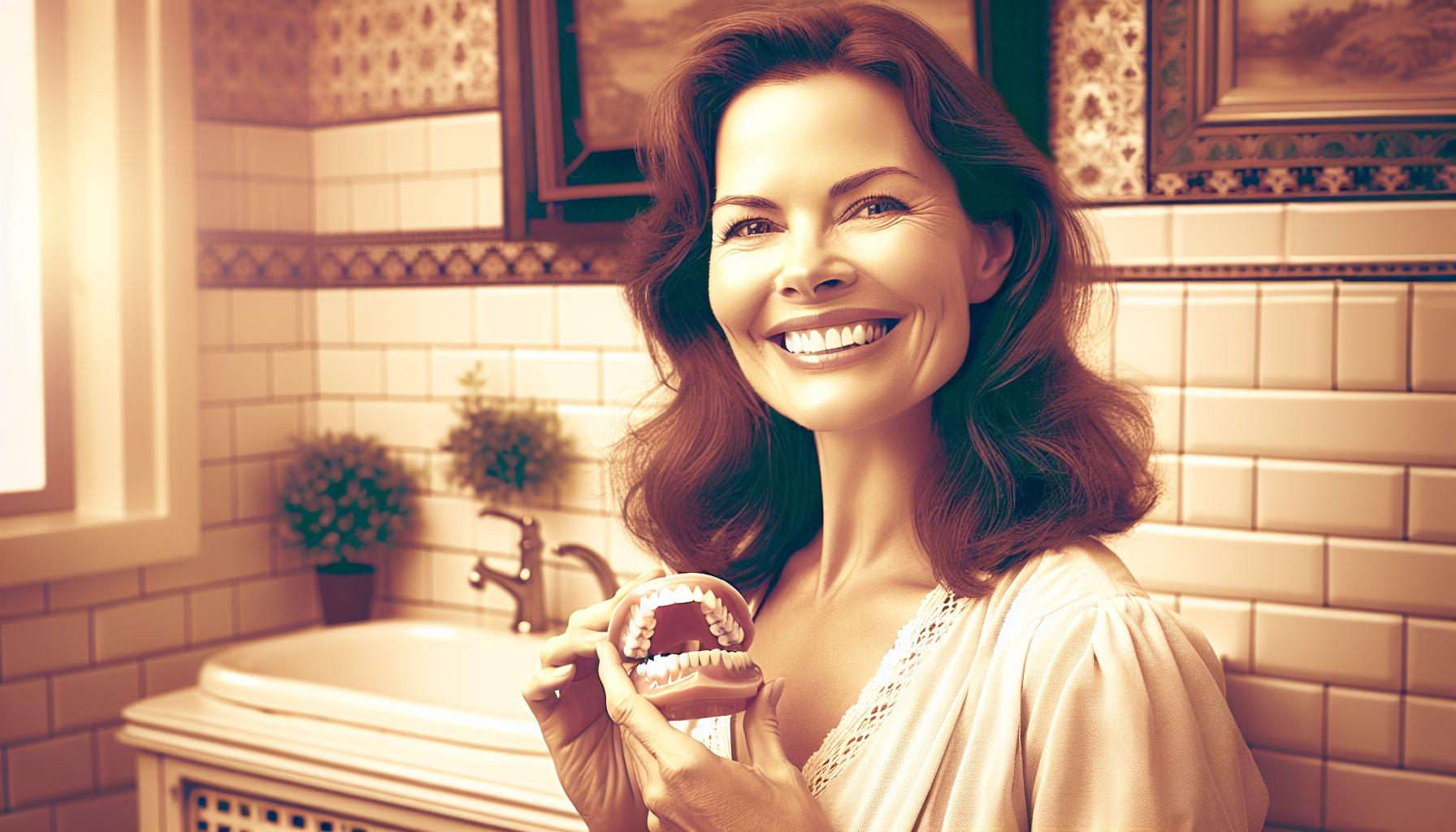Maintaining a bright smile is essential for confidence, and that includes keeping dentures looking their best. Over time, dentures can discolour due to food, drink, and natural wear. This article explores effective methods for whitening dentures, ensuring they remain fresh and vibrant, so wearers can smile with pride.
Understanding Denture Discoloration
Denture discoloration often arises from exposure to numerous factors throughout daily use. Maintaining a bright and clean appearance is crucial for the confidence of denture wearers.
Common Causes of Staining
Staining occurs due to multiple influences, including:
- Food and Drink: Beverages such as coffee, tea, and red wine can cause significant discolouration. Foods rich in colour, like berries and tomato sauces, contribute as well.
- Tobacco Use: Smoking or chewing tobacco leads to brownish stains that can be difficult to remove.
- Poor Hygiene Practices: Irregular cleaning can allow plaque and bacteria to build up, causing yellowing or greying of dentures.
- Aging: Over time, materials in dentures can become porous, leading to increased absorption of pigments from various sources.
When it comes to maintaining the brightness of false teeth dentures, consulting a professional like Radiant Smiles Dental Care can provide personalized advice and safe, effective treatments for whitening.
Types of Dentures Affected
Different denture types may experience varied levels of discoloration, including:
- Acrylic Dentures: These often stain easily due to their porous nature, making them susceptible to various pigments.
- Porcelain Dentures: While more resistant to staining, they can still show discolouration from improper care or exposure to certain substances.
- Immediate Dentures: Newly placed immediate dentures may show more staining initially as they adapt to the wearer’s mouth.
Understanding these aspects can help denture wearers take preventative measures against discolouration.
Methods for Whitening Dentures

Whitening dentures can enhance their appearance and maintain the wearer’s confidence. Several effective methods exist to achieve this, ranging from home remedies to professional treatments.
Home Remedies
- Baking Soda: Mix baking soda with water to form a paste. Apply this paste to the dentures and scrub gently with a soft toothbrush to help remove stains.
- Vinegar: Soak dentures in a solution of equal parts vinegar and water for 30 minutes. Rinse thoroughly afterwards to eliminate odours.
- Hydrogen Peroxide: Use a 3% hydrogen peroxide solution to soak dentures for a few minutes. This method aids in whitening and disinfecting.
- Lemon Juice: Combine lemon juice with baking soda to create a paste. Apply it to the dentures, allowing it to sit for a few minutes before rinsing off.
- Salt and Water: Create a saline solution by mixing salt with warm water to soak the dentures. This can help eliminate surface stains.
Professional Whitening Options
- Whitening Gel Treatments: Dentists offer whitening gels specifically designed for dentures. These gels contain bleaching agents that can significantly brighten denture materials.
- Ultrasonic Cleaners: Professional dental clinics often use ultrasonic cleaners that remove stains and debris from dentures effectively without damaging them.
- Customised Whitening Trays: Dentists can create personalised trays that fit securely over the dentures, allowing for more effective whitening with professional-grade products.
- In-Office Whitening Procedures: Dental professionals may perform in-office whitening treatments that can provide immediate and noticeable results.
- Replacement Options: If existing dentures are severely discoloured and whitening proves ineffective, dentists may suggest replacement options using more colour-resistant materials.
Utilising these methods can keep dentures looking fresh and vibrant for their wearers.
Tips for Maintaining Whiteness
Dentures require regular care to maintain their whiteness and overall appearance. Following specific routines and avoiding certain foods can keep them looking their best.
Daily Cleaning Routines
Daily cleaning helps prevent stains and discolouration. Brush dentures with a soft-bristled toothbrush and non-abrasive denture cleanser, focusing on all surfaces. Rinsing the dentures thoroughly after meals removes food particles that can lead to staining. Soaking dentures in a mild cleaning solution for a few minutes each day also assists in maintaining their appearance. Regularly replacing the cleaning solution prevents bacterial growth and preserves freshness.
Avoiding Staining Foods and Drinks
Identifying staining foods and drinks promotes denture care. Common culprits such as coffee, tea, red wine, and highly pigmented sauces can discolour dentures. Limiting consumption of these items reduces the risk of stains. For those who choose to consume such substances, rinsing the mouth with water immediately afterwards can minimise contact with the dentures. Similarly, quitting tobacco products helps prevent stubborn stains and maintains denture brightness.
Safety Considerations
Ensuring the safety of denture whitening processes is crucial for maintaining oral health. Users must be aware of the potential risks associated with certain whitening methods.
Potential Risks of Whitening
Whitening dentures can pose several risks. Overuse of abrasive substances can cause surface scratches, leading to increased discolouration and bacterial growth. Chemical whiteners may cause damage to denture materials, particularly if used improperly. Some products might contain harsh ingredients that induce allergic reactions or irritations in sensitive individuals. Denture wearers must consult their dentists before starting any whitening treatment to avoid complications.
Recommended Products
Selecting appropriate whitening products enhances safety and effectiveness. Denture cleansers containing gentle abrasives or enzymatic formulas are advisable for regular use. Specific whitening gels designed for dentures should be preferred over general teeth whitening products. Ensure compliance with manufacturer guidelines regarding application frequency. Dentists may recommend professional whitening options, which offer controlled and safe techniques to achieve optimal results without jeopardising the integrity of the dentures.
Conclusion
Whitening dentures is essential for maintaining their appearance and ensuring wearers feel confident. By understanding the causes of discolouration and employing effective whitening methods, individuals can restore their dentures to a vibrant state. Regular cleaning routines and preventive measures play a significant role in keeping dentures looking their best.
Consulting a dental professional before starting any whitening treatment is crucial for avoiding potential complications. With the right care and attention, denture wearers can enjoy a bright smile that reflects their confidence and enhances their overall well-being.
Frequently Asked Questions
What causes dentures to discolour over time?
Denture discolouration can occur due to various factors including exposure to staining foods and drinks, tobacco use, poor hygiene practices, and the natural ageing of materials. Acrylic dentures are particularly susceptible to discolouration because of their porous nature.
How can I whiten my dentures at home?
You can whiten your dentures at home using several effective methods. These include baking soda, vinegar, hydrogen peroxide, lemon juice, and a saltwater solution. These remedies help remove stains and maintain the freshness of your dentures.
Are there professional options for whitening dentures?
Yes, professional whitening options for dentures include whitening gel treatments, ultrasonic cleaners, customised whitening trays, and in-office whitening procedures. Dentists can recommend the best approach based on your specific denture material and condition.
How can I maintain the whiteness of my dentures?
To maintain denture whiteness, establish a daily cleaning routine that involves brushing with a soft-bristled toothbrush and a non-abrasive cleanser. Rinse after meals, soak in mild cleaning solutions, and avoid staining foods and drinks.
What should I avoid to prevent staining my dentures?
To prevent staining, avoid foods and drinks like coffee, tea, and red wine. Rinse your mouth after consuming such items to minimise discolouration. Quitting tobacco products is also recommended to keep dentures bright.
Is it safe to use chemical whiteners on dentures?
While some chemical whiteners can be effective, improper use may damage your dentures. It’s important to consult with your dentist before using any whitening treatments to avoid potential risks such as scratches or deterioration.
When should I consult a dentist about discoloured dentures?
Consult your dentist if home whitening methods are ineffective or if you notice significant discolouration. They can assess your dentures and recommend professional treatments or replacement options with more colour-resistant materials.
